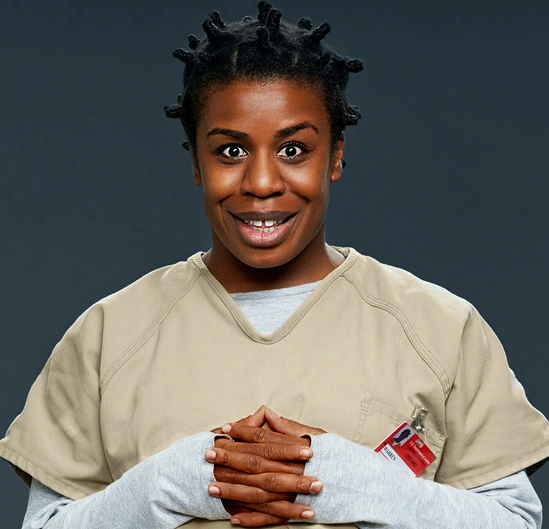One of the characters on Orange is the New Black, Cindy Hayes, “a.k.a Black Cindy” is portrayed as an unintelligent woman who often does not think about the consequences of her actions. Cindy ended up in prison because she often stole items from travelers while working as a TSA officer. Cindy is also seen leaving her younger sister locked in a car as Cindy goes to smoke marijuana with her friends in one of the shows many character flashbacks. As well as being depicted as unintelligent, Cindy is portrayed as quite lazy because she does not want to lift a finger for anyone but herself. Cindy even has to be bribed with a cake by a fellow prisoner Vee to become a part of Vee’s tobacco smuggling business.
Taystee, a friend of Cindy who is also black is actually released from prison, but cannot handle the fast pace and responsibility of the real world, so she purposefully violates her probation and ends up back in prison. To Orange is the New Black writers, this ploy may have appeared as a genius segue to Taystee’s return to prison, but it actually perpetuates the stereotype that black people are unintelligent and in this case unable to handle the responsibility of the real world.
Another black prisoner named Suzanne is portrayed as hypersexualized. A prison counselor Healy recalls that Suzanne has a problem with coming on to other prisoners and has had many prison wives in her past. Suzanne takes an interest in Piper and is seen stalking Piper and pursuing a relationship with her. Suzanne also goes on to write an extensive pornography novel that becomes highly popular among the prisoners.
Many viewers praise Orange is the New Black for its innovative plots and its unique perspective on lives of women and people of color. Though the show is quite raw and often not sugar-coated, it portrays some people of color in their unrightful stereotypes. Some viewers may interpret this racist stereotyping as comedy, but this stereotyping is not something that should be taken lightly. If popular shows like Orange is the New Black can blindly stereotype races and get away with it, what views or rights does that give our nation as a whole? Racism can not be solved if popular media keeps perpetuating stereotypes and keeps getting away with it.
Many viewers praise Orange is the New Black for its innovative plots and its unique perspective on lives of women and people of color. Though the show is quite raw and often not sugar-coated, it portrays some people of color in their unrightful stereotypes. Some viewers may interpret this racist stereotyping as comedy, but this stereotyping is not something that should be taken lightly. If popular shows like Orange is the New Black can blindly stereotype races and get away with it, what views or rights does that give our nation as a whole? Racism can not be solved if popular media keeps perpetuating stereotypes and keeps getting away with it.




Your analysis really made me think about the way this show portrays black women. I have seen extensive articles about how great the show is simply because it includes a wide range of races, but I've never really thought about the way that it portrays these races. Nice job!
ReplyDeleteAs someone who watches the show, though, I think you are being a bit unfair by taking these characters out of context and not seeing the big picture. First, these are prisoners. Their lives are complicated, as the back stories do a great job of clarifying, and the system is messing them up as well. Yet most all of them are full human beings -- so we sympathize with them. Add to that the sheer variety of representations (pop culture has never explored so many different black women) -- and I think it’s hard to say it isn’t ground-breaking in its representations of race.
ReplyDelete